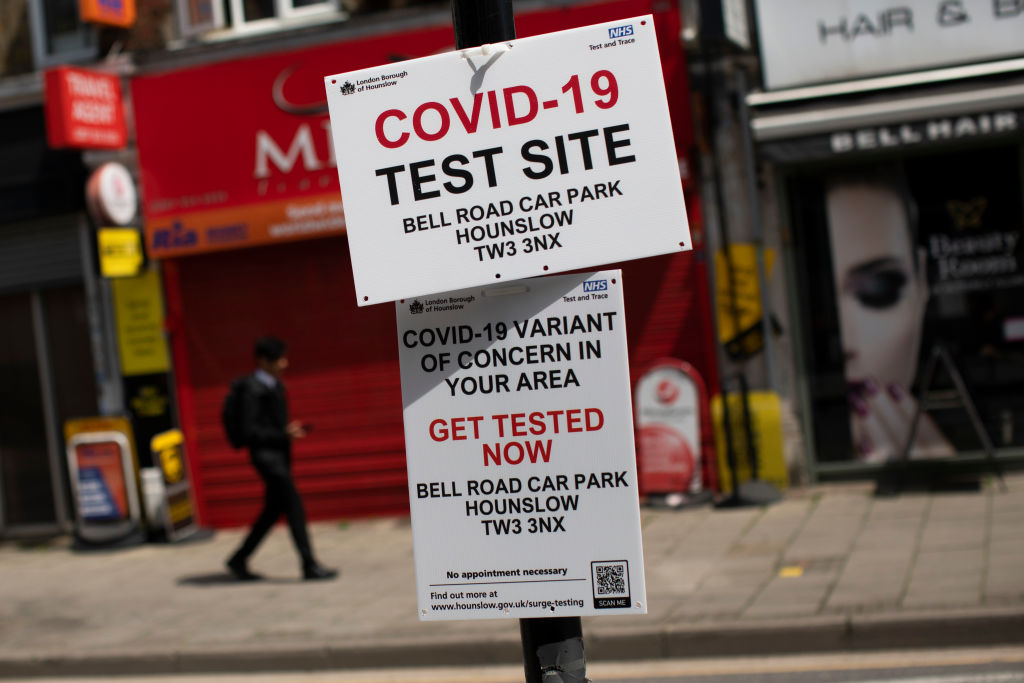Why the U.K. is seeing an uptick in COVID-19 cases


A free daily email with the biggest news stories of the day – and the best features from TheWeek.com
You are now subscribed
Your newsletter sign-up was successful
The United Kingdom is experiencing an uptick in coronavirus cases. It's "tiny" compared to previous spikes, David Leonhardt writes in The New York Times, but he adds that the country will still be "important to watch" in the next few weeks. So, considering the U.K. has had a mostly successful vaccine rollout, why is the increase happening?
The primary culprit is likely the more transmissible Delta variant, first identified in India, that's been spreading in the U.K. The good news is that it appears vaccines hold up pretty well against the mutatated virus, but less so for people who have received only one vaccine dose, which is more common in the U.K. than it is in the United States. The U.K. chose to prioritize first shots early in the rollout, which allowed a wider swath of people to get at least some protection. That was "not necessarily" a mistake, despite the Delta variant changing the game a bit, Leonhardt writes, but it does mean more people — especially younger people who are still in the middle of the vaccination process — have a higher risk of getting infected. Fortunately, about 90 percent of U.K. residents older than 65 have received both doses, and the country "is accelerating second shots for vulnerable people" now, Leonhardt writes.
Dr. Monica Gandhi, who specializes in infectious diseases at the University of California, San Francisco, also pointed out that the U.K. "does a lot of asymptomatic testing" even among the vaccinated population, which may play a role in the increase in cases and help explain why, for now at least, they aren't accompanied by rises in hospitalizations and deaths.
The Week
Escape your echo chamber. Get the facts behind the news, plus analysis from multiple perspectives.

Sign up for The Week's Free Newsletters
From our morning news briefing to a weekly Good News Newsletter, get the best of The Week delivered directly to your inbox.
From our morning news briefing to a weekly Good News Newsletter, get the best of The Week delivered directly to your inbox.
A free daily email with the biggest news stories of the day – and the best features from TheWeek.com
Tim is a staff writer at The Week and has contributed to Bedford and Bowery and The New York Transatlantic. He is a graduate of Occidental College and NYU's journalism school. Tim enjoys writing about baseball, Europe, and extinct megafauna. He lives in New York City.
-
 ‘Restaurateurs have become millionaires’
‘Restaurateurs have become millionaires’Instant Opinion Opinion, comment and editorials of the day
-
 Earth is rapidly approaching a ‘hothouse’ trajectory of warming
Earth is rapidly approaching a ‘hothouse’ trajectory of warmingThe explainer It may become impossible to fix
-
 Health insurance: Premiums soar as ACA subsidies end
Health insurance: Premiums soar as ACA subsidies endFeature 1.4 million people have dropped coverage
-
 A Nipah virus outbreak in India has brought back Covid-era surveillance
A Nipah virus outbreak in India has brought back Covid-era surveillanceUnder the radar The disease can spread through animals and humans
-
 Trump HHS slashes advised child vaccinations
Trump HHS slashes advised child vaccinationsSpeed Read In a widely condemned move, the CDC will now recommend that children get vaccinated against 11 communicable diseases, not 17
-
 Covid-19 mRNA vaccines could help fight cancer
Covid-19 mRNA vaccines could help fight cancerUnder the radar They boost the immune system
-
 FDA OKs generic abortion pill, riling the right
FDA OKs generic abortion pill, riling the rightSpeed Read The drug in question is a generic version of mifepristone, used to carry out two-thirds of US abortions
-
 The new Stratus Covid strain – and why it’s on the rise
The new Stratus Covid strain – and why it’s on the riseThe Explainer ‘No evidence’ new variant is more dangerous or that vaccines won’t work against it, say UK health experts
-
 RFK Jr. vaccine panel advises restricting MMRV shot
RFK Jr. vaccine panel advises restricting MMRV shotSpeed Read The committee voted to restrict access to a childhood vaccine against chickenpox
-
 Texas declares end to measles outbreak
Texas declares end to measles outbreakSpeed Read The vaccine-preventable disease is still spreading in neighboring states, Mexico and Canada
-
 RFK Jr. shuts down mRNA vaccine funding at agency
RFK Jr. shuts down mRNA vaccine funding at agencySpeed Read The decision canceled or modified 22 projects, primarily for work on vaccines and therapeutics for respiratory viruses
